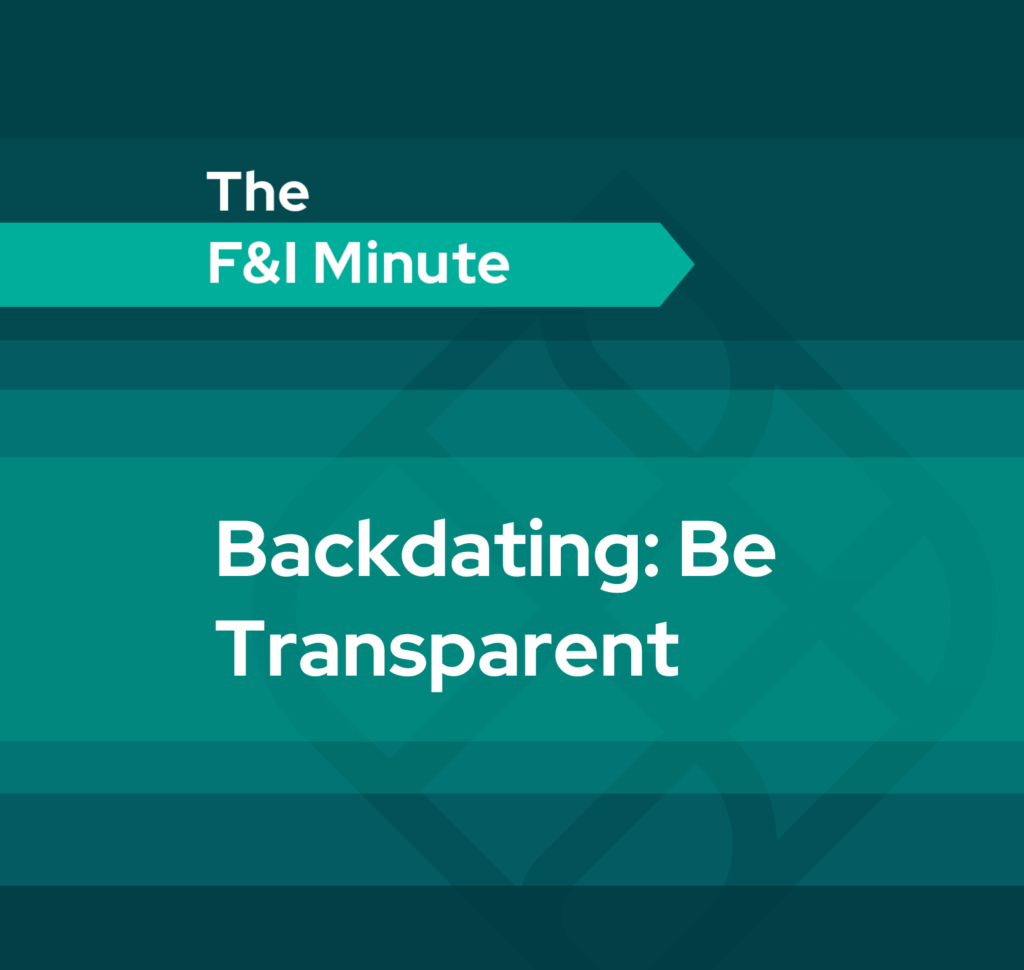So today we’re talking about backdating. Really, really exciting topic. Ryan, give me the quick overview. What is backdating? Where do we see it? You know, just give me the quick, high-level overview.
Yeah, that’s a good question. I would say backdating was more prevalent back in the day. You know, 20 years ago, we used to see it all the time. I personally have seen finance managers backdate a contract simply because they couldn’t get the customer in.
So the customer comes in, purchases a vehicle, two, three weeks later, they changed the contract and backdated to that day because they had to resign or made the bank change terms. This is not a very good practice to do because the bank considers that contract signed and interest starts from that day that you signed the contract. And if something needs to be resigned, it needs to be dated for that day.
Okay. So you said that it doesn’t really happen as often now. Like, are there consequences for doing that? Who gets dinged? Is it just the dealership? Is that the consumer? Like, tell me, what are some of the repercussions of this?
Yeah, I would start with the fact that it’s not more prevalent now because everybody’s gone to some sort of eContracting and the date is captured at that point in time. And most of these safeguards are in the e-signing already, where you cannot go back and then backdate.
You know, the people who created these things understood how bad backdating a contract actually was, so they put the safeguards in there. So that’s probably why it’s been curved. And only for that reason only. Who this actually affects is definitely the dealership, it affects the customer in, you know, some way as well because they’re being charged interest for a contract that they signed at a different time.
So what is the financial impact on the dealership?
The financial impact would come primarily from the financial institution itself. So they would make you buy the car back, or buy that contract back. And then you’re put back in a position where you have to get the customer back into a dealership again and change banks on them. This doesn’t make it look very good for the customer and it probably lowers their level of trust that they already have.
You know, if you think about how expensive vehicles have become, you having to buy back that money that you’ve already been paid, putting all of the vehicle back in inventory, it’s a big process that you have to go through, just to have not gotten the correct date the first time that you had to have them resign.
Do you, like, have advice for dealers on this? Is there any…like how are you…when you come across it, since it’s not really happening as much anymore, like, what do you tell people?
So the first thing that I tell them is, you know, all of my consultants including myself, we have an F&I background, and we understand the pain points of getting a customer back into a dealership. But the problem is backdating is illegal in every state in this country. The key here is just transparency, letting the client understand, hey, we did not have this all wrapped up, we have to have you resign.
I’ve seen dealers play games where they lie to the customer to get them back in and then change the terms just to, you know, have the correct date on the contract. Just be transparent and say, “Hey, we have to have you come back in and sign,” and make sure it’s signed for that date. You know, the more transparent you are with a customer, the more they’re going to, one, believe and trust in you. And then two, you’re going to probably have a repeat customer because you were upfront and honest.
Now if you have to bring them in three or four different times to keep changing contracts, that’s a little bit different. But what’s important to remember is they rely on you. They don’t understand all of the banking laws and things that you actually have to do just to get a deal bought, so kind of explain it to them, be upfront and honest and say, “This didn’t go through the way we thought, this is what it is now,” and make sure the date is correct.
This also goes into play with the other items in the deal. So if you sell a vehicle service contract or GAP, those things should be dated for the same day as the other contract as well because if they don’t match, those can be problematic in the long run too because your warranty start date is the contract date, 9 times out of 10. There’s a few caveats in there, however, so is the GAP. So if the GAP changes, you know, those dates should all match as well just for consistency.
So basically, I’m hearing, fess up when you mess up and you’ll be fine.
Absolutely. There’s nothing wrong… The one thing I tell dealers all the time is, you employ human beings, human beings make mistakes. Even with all the technology that we have, things do happen. Transparency is key when it comes to compliance.
Yeah, great. All right. Well, I think with that we’re going to wrap up today.

